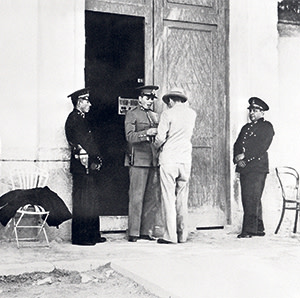‘The Man Who Loved Dogs’, by Leonardo Padura
Simply sign up to the Life & Arts myFT Digest -- delivered directly to your inbox.
The Man Who Loved Dogs, by Leonardo Padura, translated by Anna Kushner, Bitter Lemon Press, RRP£20 / Farrar, Straus and Giroux RRP$35, 576 pages

The Man Who Loved Dogs, by Cuban author Leonardo Padura, is a stunning novel, chronicling the evisceration of the Communist dream and one of the most “ruthless, calculated and useless” crimes in history.
Spanning wide tracts of the globe, sweeping through some of the most tumultuous events of the 20th century and interweaving the lives of three wildly different characters, this monumental, intricately structured work recounts the events that lay behind the assassination of Lev Davidovich Trotsky in Mexico City in 1940.
The narrator of the novel, Iván Cárdenas Maturell, is a disillusioned writer struggling to find love and purpose in Castro’s Cuba. One day in 1977 he meets a mysterious man walking two beautiful Russian wolfhounds on a beach outside Havana. As their friendship builds, the author gradually learns the secrets of the dog owner’s remarkable life.
The man tells the story of Ramón Mercader, a Spanish revolutionary swept up in the passions of his country’s civil war who becomes an impersonal “instrument of hate” in the Stalinist cause. To make the world a better place, he is instructed to forget his soul, and he duly obeys. Urged on by his ideologically crazed mother, forced to live apart from the woman of his dreams and to abandon their daughter, he is slowly drained of all personal identity and feeling, as if moulded to Moscow’s will. Lost in a labyrinth of lies, all that counts in his life is the revolution’s greater good, at least as defined by Stalin.
Meanwhile, we track Trotsky’s pitiful odyssey from Central Asia to Turkey, Norway and Mexico as the mighty lion of the Great October Socialist Revolution is reduced to a physically enfeebled refugee shuffling between countries embarrassed by his presence. Other exiled revolutionaries are drawn back to the Soviet Union, preferring the certainty of death to “the risk of every day having to demonstrate the courage to live”. Each day that Trotsky remains alive is therefore a small feat of bravery and an act of defiance.
As Stalin tightens his grip on the Kremlin, Trotsky is left to fulminate against the “death rattle of utopia” and the revolution’s macabre slide towards despotism. Only a liaison with the exotic Mexican artist Frida Kahlo reminds him of the mesmeric personality he once was.
Trotsky ends his days a hunted and haunted figure tending rabbits and cacti in a fortified house in Mexico City, fully conscious of the tragic ways in which events are developing, but powerless to prevent the downward spiral into the second world war. The scream of surprise and horror he emits as his skull is smashed by Mercader’s ice axe stays with his assassin until the end of his days.
It is a measure of Padura’s humanity and skill as a novelist that the reader can at times empathise with all three characters despite their cruel actions and manifest flaws. In Padura’s telling, to know is to love, or at least to understand. Judgment is suspended as they grapple with their consciences and become reconciled to their fates. In a world in which they are all “embalmed in cynicism”, as one character puts it, the only unconditional affection that any of them can muster is directed towards their dogs.
One of the novel’s most striking features is the harsh depiction of Castro’s Cuba, as a final, dismal coda to the revolutionary hopes of 1917. The narrator is unsparing in his criticisms of the country’s moral bankruptcy, “where intelligence, decency, knowledge, and capacity for work gave way before craftiness, proximity to the dollar, political placement, being the son, nephew, or cousin of Someone, the art of making do, inventing, increasing, escaping, pretending, stealing everything that could be stolen. And cynicism, bastard cynicism”.
It seems astonishing to the foreign reader that the author of such a critique could have been awarded Cuba’s National Literature Prize. But Padura is better known in Havana for his more populist crime series featuring the detective Mario Conde. A recent profile of Padura in the New Yorker suggested that the writer’s literary achievement was matched by his political agility, knowing how to trespass right up to the edge of political acceptability without going beyond it. It quotes Padura as saying: “I believe enough space has been achieved for almost everything to be published in Cuba.” But, he added, most Cubans were unaware of most of what was being published. Only about 2,000 copies of The Man Who Loved Dogs were distributed in Cuba and the book was hardly mentioned in the state media.
All credit to Bitter Lemon Press and Farrar, Straus and Giroux for publishing such a readable English translation, even if it does contain the odd jarring phrase. There can be few more insightful explorations of the ways in which communism corroded the human spirit and justified the most monstrous of crimes.
“I had learned that true human grandeur lay in the practice of kindness without conditions, in the capacity of giving to those who had nothing,” the narrator concludes. We would do well to love our fellow man as Trotsky and his murderer loved their dogs, he seems to suggest.
——————————————-
John Thornhill is the FT’s deputy editor
——————————————-
Letter in response to this article:
Trotsky spent last years in Mexico / From Prof Lawrin Armstrong
Comments